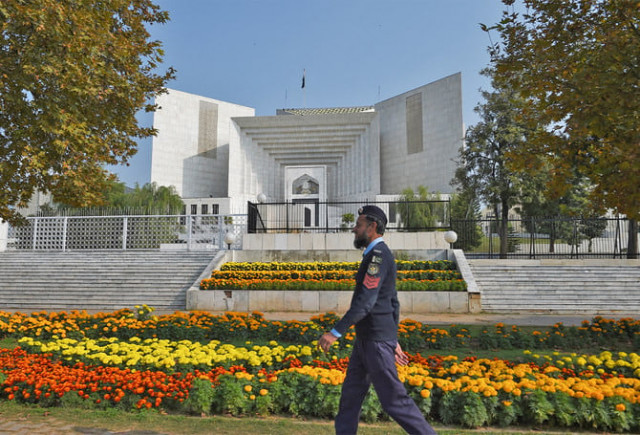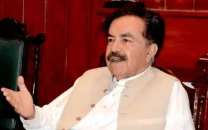SC questions Imran’s conduct
Judge asks if PTI chief weakening parliamentary system as court resumes hearing plea against NAB law tweaks

As the Supreme Court on Friday resumed the hearing of a plea challenging the amendments to the country’s accountability law, a judge raised questions about the conduct of the petitioner, PTI Chairman Imran Khan.
Justice Mansoor Ali Shah pointed out that Imran and his party had refrained from voting on the bill to introduce the amendments to the National Accountability Ordinance (NAO).
“Do those who refrained from voting [on the bill] have the right to move the court,” he asked.
“Can an MNA leave parliament empty? Isn’t bringing legislative matters to court weakening the parliamentary system?,” he added.
A three judge-bench comprising Chief Justice of Pakistan Umar Ata Bandial, Justice Ijazul Ahsan, and Justice Shah continued the hearing of the former premier Imran’s petition challenging the current government’s changes in the National Accountability Bureau (NAB) law.
Justice Shah observed that Imran’s resignation had not been accepted yet, and that meant that he was still a member of the lower house.
He continued that an MNA was a representative of their constituents and a trustee of the faith they had placed in them.
The judge inquired would it be appropriate for a trustee of the people’s confidence to boycott parliament.
“Wouldn’t the parliamentary system be weakened if a lawmaker boycotted parliament during the process of legislation and then came to the court,” he added.
Justice Shah raised the question how it would be determined that the plea against the NAB law amendments was a case of public interest.
“Will public interest be determined by three judges sitting in a court?” he asked.
The judge further raised the question if there was public outcry over the NAB amendments law.
He added that it still had not been pointed out which fundamental rights the NAB amendments were in conflict with.
Justice Shah noted that Imran’s lawyer kept mentioning Islamic provisions and the basic structure of the Constitution.
Federal government’s lawyer Makhdoom Ali Khan said during the hearing that Imran could have defeated the NAB amendments bill in the assembly if he wanted.
He added that the PTI would have been in majority during a joint sitting of parliament.
The CJP told him that the court would seek an answer from Imran about this point.
The top judge remarked that a case of public interest could not be ignored simply because of the fact that the petitioner’s conduct was improper.
He added that every leader relied on the Constitution to justify their actions.
He further observed that boycotting parliament was the PTI’s political strategy and it was not necessary that it had any legal aspects to it.
CJP Bandial remarked that sometimes, a legal strategy seemed a mistake from a political perspective.
He continued that boycotting parliamentary proceedings was a worldwide practice and the subcontinent had a long history of it.
Justice Ahsan asked how many lawmakers had voted in the favour of the NAB amendments law during the joint sitting of parliament.
The government’s lawyer told him that there were 166 lawmakers present in parliament at the time.
Justice Ahsan pointed out that there were 466 lawmakers in a joint sitting and that meant that not even half of the total had voted for the bill.
He added that the court was only taking fundamental rights and exceeding constitutional jurisdiction into consideration.
The judge further remarked that the petitioner had challenged the amendments arguing that they were against fundamental rights and public interest.
He continued that Imran’s conduct would have been under question if he had some personal gains from the amendments.
“Apparently, the petitioner [Imran] has no personal gains linked to the amendments,” he added.
The government’s lawyer contended that it was not necessary to challenge the amendments for personal gains.
He added that Imran could have benefitted politically by challenging the amendments.
Khan pointed out that the PTI had moved the court when its resignations were not being accepted.
However, he added that the party again approached the court when its resignations were finally given the nod.
The lawyer said Imran had deliberately decided to leave parliament empty.
CJP Bandial observed that Imran was probably aware that he would not succeed in parliament and that was why he had moved the court.
He added that besides being a political leader, Imran was also a common citizen.
The government’s lawyer told the court that a case was decided on facts and not speculations.
He added that it was not necessary for the court to declare a law valid or abolish it and could simply not pass any judgment.
Justice Shah inquired if the SC abolished a law, then would it not pave the way for anyone to challenge any legislation before the court in the future.
He added that a sole person from a political party had challenged the amendments, but it was possible that other members were in favour of them.
The hearing of the case was later adjourned till February 14.



















COMMENTS
Comments are moderated and generally will be posted if they are on-topic and not abusive.
For more information, please see our Comments FAQ